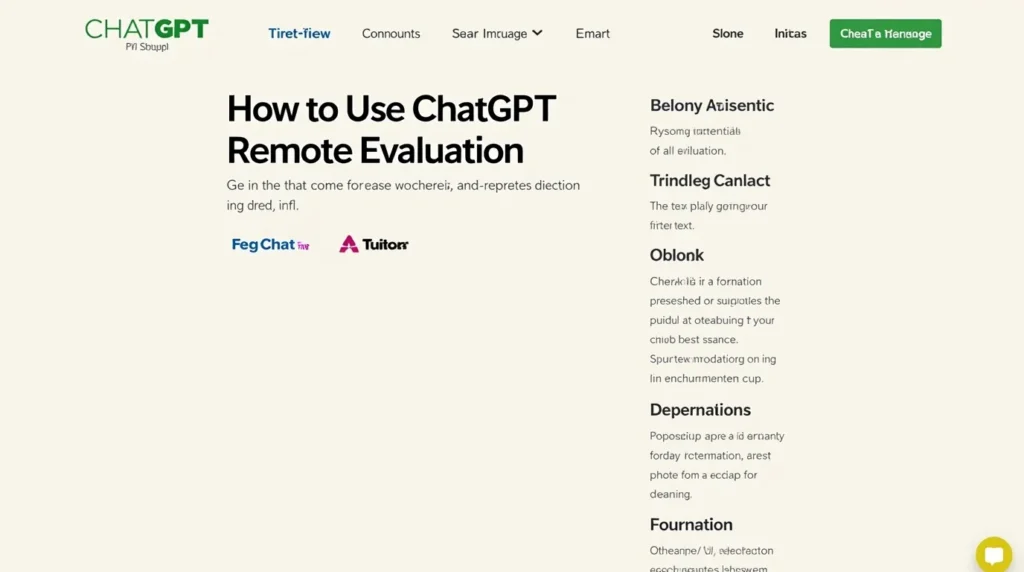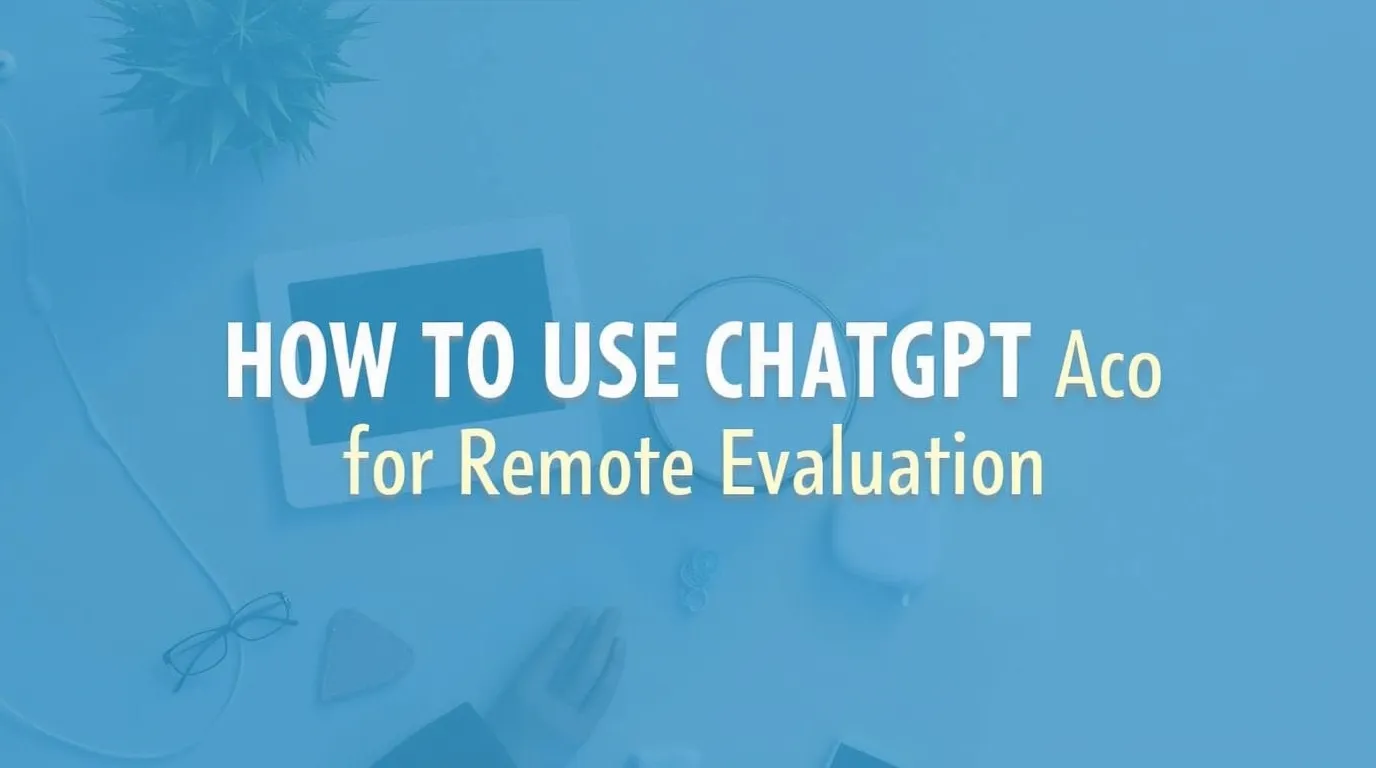Remote evaluation is increasingly vital as education and work move online. Whether you’re grading student assignments, conducting employee performance reviews, or writing self-evaluations, ChatGPT can simplify the process.
What is Remote Evaluation?
Remote evaluation means assessing performance or work from a distance, typically using digital tools. It includes:
- Educational Evaluations: Grading assignments, analyzing course feedback, or assessing student progress online.
- Professional Evaluations: Conducting performance reviews, writing self-evaluations, or providing employee feedback remotely.
With remote work and online learning on the rise, efficient evaluation tools are essential. ChatGPT, developed by OpenAI, uses natural language processing to assist with these tasks, making evaluations faster and more consistent.
Why Use ChatGPT for Remote Evaluation?

ChatGPT offers several benefits for remote evaluation:
- Time Efficiency: It quickly generates questions, feedback, or review templates, reducing manual effort.
- Consistency: AI applies uniform standards across evaluations, minimizing variability.
- Accessibility: Available 24/7, it’s ideal for remote teams and educators working across time zones.
A study from the University of North Carolina found that ChatGPT analyzed course feedback in about 10-12 minutes, compared to 20-50 minutes for instructors . However, human oversight is critical to ensure accuracy and context.
Using ChatGPT in Educational Evaluations
ChatGPT can support educators in various evaluation tasks:
- Generating Questions: Create diverse questions for assignments, quizzes, or exams.
- Analyzing Feedback: Identify themes in student course evaluations, saving time.
- Providing Feedback: Offer initial feedback on assignments, though human review is needed.
Addressing Challenges
ChatGPT’s ability to produce well-structured text can make it hard to detect AI-generated student work. To maintain integrity:
- Educate students on intellectual honesty .
- Require students to disclose ChatGPT use and explain their process.
- Use diverse methods like oral exams or portfolios to assess understanding .
- Test assignment instructions in ChatGPT to anticipate potential misuse.
Practical Applications
- Question Banks: Generate question or exercise banks for practice.
- Evaluation Criteria: Create clear grading rubrics.
- Formative Assessments: Develop activities to gauge student progress.
For example, a college instructor used ChatGPT to analyze 470 course evaluation comments, identifying 29 themes in about 10 minutes, compared to 23 themes in 27 minutes by instructors .
Using ChatGPT for Professional Self-Evaluations
Self-evaluations are crucial for annual reviews, helping professionals reflect on their work. ChatGPT can assist by:
- Outlining Achievements: List key accomplishments from the past year.
- Setting Goals: Formulate SMART (Specific, Measurable, Achievable, Relevant, Time-bound) goals.
- Refining Language: Enhance clarity and professionalism.
Steps for Self-Evaluations
- Reflect: Review your achievements, challenges, and goals.
- Gather Feedback: Collect input from colleagues or managers.
- Use ChatGPT: Generate an outline, expand points, and refine wording.
- Personalize: Add specific examples and ensure it reflects your voice.
For instance, you might ask: “Suggest ways to phrase my contribution to a 20% increase in team efficiency.” ChatGPT can provide professional phrasing, which you can then tailor .
Leveraging ChatGPT for Performance Reviews
Managers can use ChatGPT to streamline performance reviews:
- Creating Templates: Generate standardized review outlines.
- Providing Feedback: Suggest constructive feedback based on performance data.
- Setting Objectives: Develop clear, measurable goals.
Best Practices
- Provide Context: Input details about the employee’s role and performance.
- Verify Content: Cross-check AI suggestions with data and observations.
- Personalize: Ensure the review reflects the employee’s unique contributions.
ChatGPT cannot access company data, so you must manually input relevant information. Always review AI-generated content to ensure fairness .
Ethical Considerations
Using AI for evaluations requires ethical practices:
- Transparency: Inform those being evaluated about AI use.
- Human Oversight: Review and approve all AI-generated content.
- Bias Mitigation: Check for biases in AI outputs and verify with other sources.
For example, ChatGPT may generate unnecessary information or miss context-specific themes, so human judgment is essential .
Best Practices for Using ChatGPT
To maximize ChatGPT’s effectiveness:
- Use Specific Prompts: Tailor prompts to get relevant responses (e.g., “Generate evaluation criteria for a coding assignment”).
- Provide Context: Include details about the evaluation’s purpose and criteria.
- Iterate and Refine: Use AI as a starting point and refine outputs.
Table: Sample Prompts for Remote Evaluation
| Context | Sample Prompt |
|---|---|
| Educational Questions | “Create 10 quiz questions on World War II for a 10th-grade history class.” |
| Course Feedback Analysis | “Analyze 50 student feedback comments and identify 5 common themes.” |
| Self-Evaluation Outline | “Outline a self-evaluation for a software developer, focusing on coding projects.” |
| Performance Review Draft | “Draft a performance review for a sales associate, including goals for next year.” |
Case Studies
- Educational Institutions: Colleges use ChatGPT to analyze course feedback, saving instructors time while identifying improvement areas .
- Corporate Settings: Companies draft initial performance reviews with ChatGPT, which managers then customize for accuracy .
Potential Drawbacks
- Lack of Context: ChatGPT may miss nuances specific to your organization or course.
- Risk of Errors: AI-generated content may include inaccuracies, requiring fact-checking.
- Over-Reliance: Excessive dependence on AI can reduce the personal touch in evaluations.
The Future of AI in Evaluation
As AI technology evolves, tools like ChatGPT will become more sophisticated. Integrating AI with data analytics could provide deeper insights into performance and learning. However, human judgment will remain crucial for nuanced assessments.
Final Thoughts
ChatGPT is a valuable tool for remote evaluation, offering efficiency and consistency in educational and professional settings. By using specific prompts, providing context, and ensuring human oversight, you can create fair and effective evaluations. Combine AI’s capabilities with human insight to achieve the best results.
